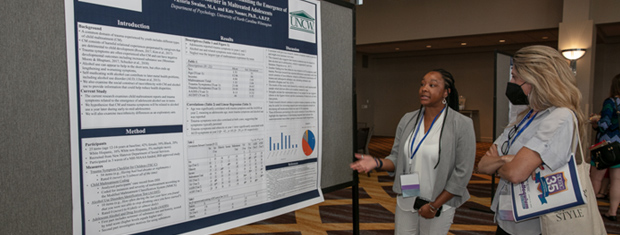




The APSAC Advisor is a peer reviewed quarterly news journal for professionals in the field of child abuse and neglect.
The APSAC Advisor provides succinct, data-based, practice-oriented articles that keep interdisciplinary professionals
informed of the latest developments in policy and practice the field of child maltreatment. It is designed to highlight
best practices in the field and publish original articles and current information about child maltreatment for professionals
from a variety of backgrounds including medicine, law, law enforcement, social work, child protective services, psychology,
public health and prevention in the U.S.
 If you wish to learn more about submitting an article to the Advisor, please click here.
If you wish to learn more about submitting an article to the Advisor, please click here.
This library contains Advisor issues dating back to the first issue in 1988. The most recent issue appears at the top.
Scroll down to select past issues by year and issue number. Once a publication appears in the box, you
can use the Enlarge button to open the document in a new window or tab (depending on how your browser is set up).
This will allow you to view the document with larger print.
To print a document, first use the Enlarge button to open the document in a new window or tab. Then use your browser's Print command.
To return here from a new tab, close the tab. To return from a new window, click your browser's Back button.
In the listing below, click on a year and issue number to see the articles in that publication.
2021 Number 2
Fedele F. and Iris M. Fauri 2020 Memorial Lecture: Child Welfare and the COVID-19 Pandemic
The COVID-19 pandemic has brought new challenges to assuring the well-being of children, adding to enduring concerns about the inadequacy of child welfare services and a deterioration of the child welfare workforce. This article summarizes remarks from an expert panel, which was convened for the 2020 Fedele F. and Iris M. Fauri Memorial Conference at the University of Michigan School of Social Work. This online conference was titled “Child Welfare and the COVID-19 Pandemic.” Panelists explained how child welfare systems have been impacted by the COVID-19 pandemic and what these systems have done to respond to increasing and changing demands brought about by shifts in child welfare policies and practices. Panelists also commented on how insights from the pandemic can help to lessen the risk of child abuse and neglect in the future.
Extreme caregiver stress, economic uncertainty, housing and food insecurities, and social isolation coupled with limited access to mental health, substance use treatment, and other community supports have historically rendered children more vulnerable to abuse victimization. Similar pandemic-related societal circumstances have sparked concern for an inevitable, co-occurring epidemic of child abuse wreaking further havoc during an already disastrous COVID-19 pandemic. While early data demonstrating abuse and neglect victimization trends have provided mixed results, what is clear is that the pandemic has notably compelled “lessons learned” across the multidisciplinary team (MDT) of professionals responding to child maltreatment concerns. Besides the emergence of innovative, technologic adaptations; a focus on COVID-19 as the latest adverse childhood experience; and lessons learned about protective family-level factors and experiences, the pandemic suggests an urgent need for a paradigm shift within child welfare toward increased upstream family supports, emotional connectedness, and resiliency as more effective strategies to prevent abuse and neglect.
After the outbreak of the COVID-19 pandemic in March 2020, the child welfare system has experienced its unprecedented impacts. This study examined the impact of the early pandemic on the number of investigations of child maltreatment, demographics of children and perpetrators involved in these investigations, allegation types, and substantiation. This study compared administrative data from the state of Michigan between March 15, 2019 and April 14, 2019 (i.e., before the outbreak of the COVID-19 pandemic) and between March 15, 2020 and April 14, 2020 (i.e., early stage of the outbreak of the COVID-19 pandemic). The results from bivariate analysis showed a substantial decrease in the number of investigations of child maltreatment, younger age among child victims, and greater percentage of concluding dispositions within 30 days after a maltreatment report. The racial and gender composition of children and the gender composition of perpetrators involved in maltreatment allegations did not statistically significantly differ prior to and after the outbreak of the COVID-19 pandemic. The results from logistic regression showed that the rate of substantiation increased after the outbreak. Practice and research implications are provided.
The 2018 Pennsylvania state budget directed funds toward maternal and child home visiting as a promising mechanism to support families impacted by the opioid epidemic, funding 20 pilots across the state. Pilot sites used the funding to adapt services to fit community needs. ? An addendum to the final survey of an ongoing mixed-methods implementation evaluation of these pilots assessed the impact of the COVID-19 pandemic on home visiting programs serving families impacted by opioid use disorders, as perceived by pilot-engaged staff. Data from this addendum suggest that shifting services to virtual removed barriers to group participation, like transportation and childcare, but presented technological challenges and increased the difficulty of trust-building. Site respondents reported that grandparent-caregivers struggled with suspended parental visitations and childcare during the pandemic. ?
Active duty military families face unique challenges (e.g., frequent deployments and geographic relocations) that may serve to exacerbate or diminish risk and protective factors for child maltreatment. However, active duty military families’ risk and protective factors for child maltreatment in the context of the COVID-19 pandemic is largely unexplored. To this end, we used a convergent parallel mixed methods design to explore practitioner- and parent-reported risk and protective factors for child maltreatment during the COVID-19 pandemic. Through a qualitative analysis, Army New Parent Support Program practitioners reported mental health, stress, support, family relationships, and resilience as risk and protective factors for child maltreatment in Army families. In convergence with these findings, quantitative analyses revealed that parent-reported psychological distress, relationship discord, uncontrolled anger, and isolation were associated with increased risk for child maltreatment. Divergence in results was also examined, and implications for practices are discussed.
Families at the Intersection of Racial Injustice, COVID-19, and Child Welfare
Considering the disruption caused by COVID-19 and the racial unrest of 2020 and 2021, professionals helping children affected by child maltreatment are seeking ways to better serve Black, Indigenous, and People of Color (BIPOC) communities at the intersection of the pandemic, racial injustice, and child welfare involvement. From a multidisciplinary perspective, this commentary provides a glimpse into the injustices experienced by BIPOC communities, which have been exacerbated by COVID-19. We briefly point out initial steps for professionals to take to strive towards equity in their service to children affected by child maltreatment during the pandemic. We also call upon professionals to oppose decisions that may promote systemic racism in our field and to give voice to BIPOC communities based on how these groups may experience child maltreatment policies and initiatives that have been created without their input by those that have amassed power.
APSAC Advisor 33(2): Full Issue